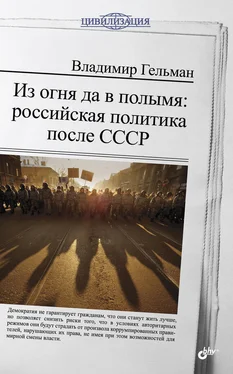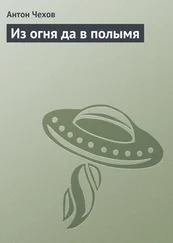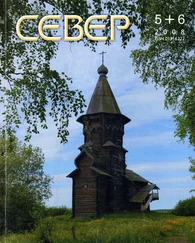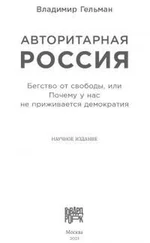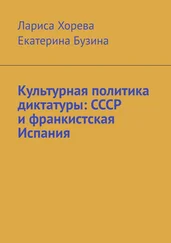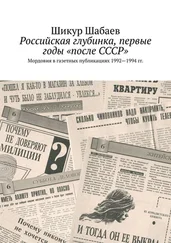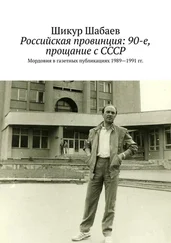См.: Титков А. Партия № 4: «Родина» и окрестности. М.: Панорама, 2006.
См.: Aslund A., Comparative Oligarchy: Russia, Ukraine, and the United States // CASE Network Studies and Analyses, 2005, N296 http://papers.ssrn.com/sol3/papers.cfm?abstract_id=1441910 (доступ 19.06.2012), Volkov V., Standard Oil and Yukos in the Context of Early Capitalism in the United States and Russia // Demokratizatsiya: The Journal of Post-Soviet Democratization, 2008, vol. 16, N3. P. 240–264.
См.: Gel\'man V., The Logic of Crony Capitalism: Big Oil, Big Politics, and Big Business in Russia // Resource Curse and Post-Soviet Eurasia / ed. by V.Gel\'man, O. Marganiya. Lanham, MD: Lexington Books, 2010. P. 97–122.
Петров H. Корпоративизм vs. регионализм // Pro et Contra, 2007. T. 11, № 4–5. С 75–89.
Wilson A. Virtual Politics: Faking Democracy in the Post-Soviet World. New Haven: Yale University Press, 2005. P. 41.
См.: Schedler A, The Menu of Manipulations // Journal of Democracy, 2002, vol. 13, N2. P. 36–50.
См.: Голосов Г. Демократия в России: инструкция по сборке. СПб.: БХВ-Петербург, 2012.
Wilson К., How Russians View Electoral Fairness: A Qualitative Analysis // Europe-Asia Studies, 2012, vol. 64, N1. P. 152.
См.: Добронравии H. Нигерийская модернизация, локализация демократии и перманентный кризис федерализма. Санкт-Петербург: Европейский университет в Санкт-Петербурге, препринт Центра исследований модернизации М-17/10, 2010 http://www.eu.spb.ru/images/M_center/M_17_10_for_site.pdf (доступ 19.06.2012).
См., например: Russia in 2020: Scenarios for the Future / ed. by M. Lipman, N. Petrov. Washington, DC: Carnegie Endowment for International Peace, 2011. Среди 27 авторов различных глав этой книги, вышедшей из печати накануне 4 декабря 2011, почти никто не предполагал подобного результата, и лишь в заключении книги редакторы предположили, что исходом электорального цикла 2011–2012 годов в России может стать «революция блоггеров».
Magaloni В. The Game of Electoral Fraud and the Ousting of Au thoritarian Rule // American Journal of Political Science, 2010, vol. 54, N3. P. 751–765.
Democratization by Elections: A New Mode of Transition / ed. by S.Lindberg S. Baltimore, MD: Johns Hopkins University Press, 2009.
Tucker J., Enough! Electoral Fraud, Collective Action Problems, and Post-Communist Colored Revolutions // Perspectives on Politics, 2007, vol. 5, N3. P. 535–551.
Huntington S., The Third Wave: Democratization in the Late Twentieth Century. Norman, OK: University of Oklahoma Press, 1991. P. 174–180.
Fish M.S. Democracy from Scratch: Opposition and Regime in the New Russian Revolution. Princeton, NJ: Princeton University Press, 1995; Urban M. et al. The Rebirth of Politics in Russia. Cambridge: Cambridge University Press, 1997.
Przeworski A. et al., Democracy and Development: Political Institutions and Well-being in the World, 1950–1990. Cambridge: Cambridge University Press, 2000.
Kalathil S., Boas T. Open Networks, Closed Regimes: The Impact of the Internet on Authoritarian Rule. Washington, DC: Carnegie Endowment for International Peace, 2003.
Treisman D. Presidential Popularity in a Hybrid Regime: Russia under Yeltsin and Putin // American Journal of Political Science, 2011, vol.55, N3. P. 590–609; Rose R., Mishler W., Munro N. Popular Support for an Undemocratic Regime: The Changing Views of Russians. Cambridge: Cambridge University Press, 2011.
Tucker J., Op. cit; Bunce V, Wolchik S. Defeating Dictators: Electoral Change and Stability in Competitive Authoritarian Regimes //World Politics, 2010, vol. 62, N1. P. 43–86.
Levisky S., Way L., Competitive Authoritarianism: Hybrid Regimes after the Cold War. Cambridge: Cambridge University Press, 2010.
Hale H., Regime Cycles: Democracy, Autocracy, and Revolution in Post-Soviet Eurasia //World PoUtics, 2005, vol. 58, N1. P. 133–165.
Wilson A., Virtual Politics: Faking Democracy in the Post-Soviet World. New Haven, CT: Yale University Press, 2005.
Косвенным свидетельством низкой репрессивности российского режима мог служить список политических заключенных, составленный оппозицией в феврале 2012 года – в него вошли всего 39 имен: невероятно низкий показатель по меркам авторитаризма.
Gel\'man V, Political Opposition in Russia: A Dying Species? // Post-Soviet Affairs, 2005, vol. 21, N3. P. 226–246.
Rose R., Mishler W., How Do Electors Respond to an «Unfair» Election? The Experience of Russians // Post-Soviet Affairs, 2009, vol. 25, N2. P. 118–136; Wilson K., How Russians View Electoral Fairness: A Qualitative Analysis // Europe-Asia Studies, 2012, vol. 64, N1. P. 145–168.
Gel\'man V, Party Politics in Russia: From Competition to Hie rarchy// Europe-Asia Studies, 2008, vol. 60, N6. P. 913–930.
Gel\'man V, Ryzhenkov S., Local Regimes, Sub-National Governance, and the «Power Vertical» in Contemporary Russia // Europe-Asia Studies, 2011, vol. 63, N3. P. 449–465.
Kynev A., Party Politics in the Russian Regions: Competition of Interest Groups under the Guise of Parties // The Politics of Sub-National Authoritarianism in Russia / ed. by V Gel\'man, C. Ross. Farham, Ashgate, 2010. P. 135–150.
Медведев Д. Россия, вперед! http://www.gazeta.ru/comments/2009/09/10_a_3258568.shtml (доступ 19.06.2012).
См., например: Милов В. Стоп, Россия! http://www.gazeta.ru/column/milov/3260272.shtml (доступ 19.06.2012) и ряд других откликов.
Geddes В., Paradigms and Sand Castles; Theory Building and Research Design in Comparative Politics. Ann Arbor, MI: University of Michigan Press, 2003. P. 47–88.
Brym R., Gimpelson V., The Size, Composition, and Dynamics of the Russian State Bureaucracy in the 1990s // Slavic Review, 2004, vol. 63, N1. P. 90–112.
Об этом, например, свидетельствует практика назначений и отставок российских губернаторов после отмены губернаторских выборов. См. Титков А. Кризис назначений // Pro et Contra, 2007. Т. 11, № 4–5. С. 90–103.
Читать дальше
Конец ознакомительного отрывка
Купить книгу
